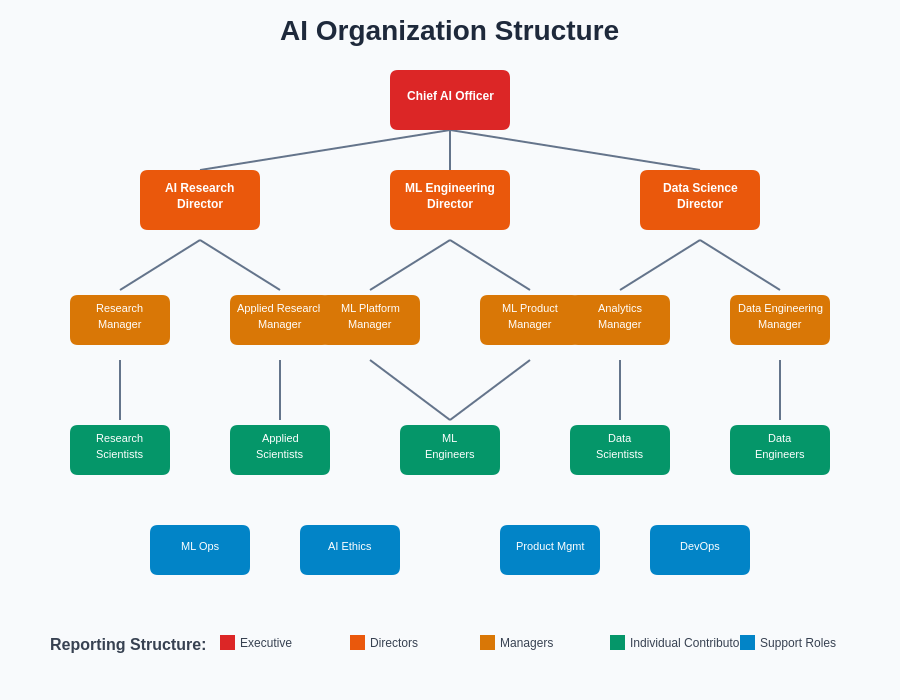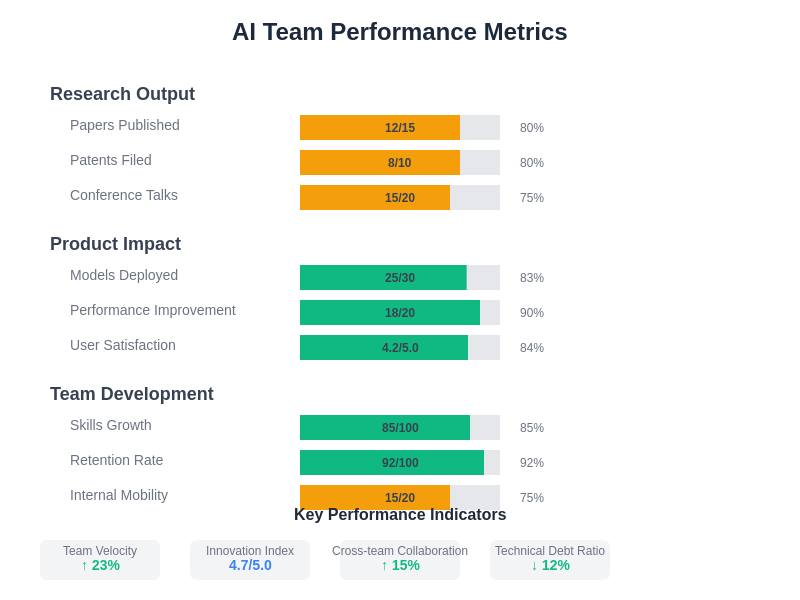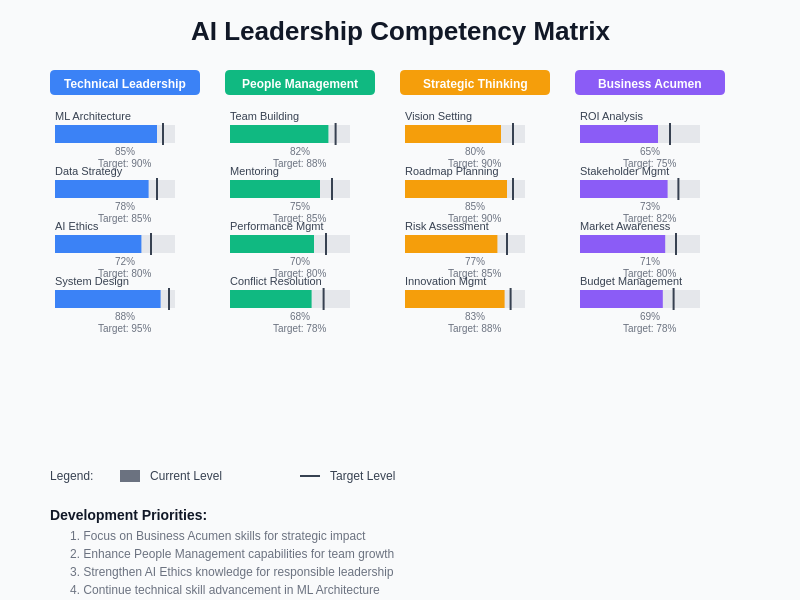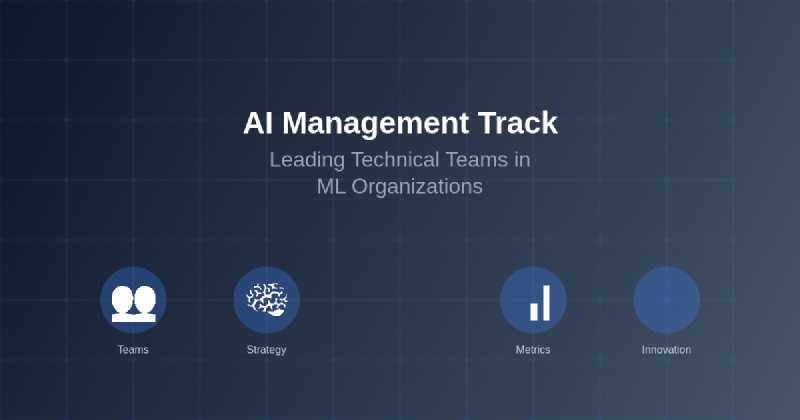The rapid evolution of artificial intelligence and machine learning has created an unprecedented demand for skilled technical leaders who can navigate the complex intersection of cutting-edge technology, team dynamics, and business objectives. Leading technical teams in ML organizations requires a unique blend of deep technical understanding, strategic vision, and human-centered leadership approaches that traditional software management methodologies cannot adequately address. The role of an AI manager extends far beyond conventional project oversight, encompassing the orchestration of experimental research processes, the management of highly specialized talent, and the translation of theoretical breakthroughs into practical business solutions.
Stay updated with the latest AI leadership trends to understand how management practices are evolving alongside technological advances in machine learning and artificial intelligence. The landscape of AI management continues to shift as organizations grapple with the challenges of scaling AI initiatives, integrating diverse technical disciplines, and fostering innovation while maintaining operational excellence and ethical standards.
The Unique Challenges of AI Team Leadership
Managing artificial intelligence and machine learning teams presents fundamentally different challenges compared to traditional software development leadership roles. The inherent uncertainty in AI research and development creates an environment where traditional project management methodologies often fall short, requiring leaders to embrace experimental approaches while maintaining team morale and business alignment. AI projects frequently involve extended periods of research and experimentation where tangible progress may not be immediately visible, demanding managers who can maintain team confidence and stakeholder support during these critical exploration phases.
The interdisciplinary nature of AI work necessitates leadership approaches that can effectively coordinate between data scientists, machine learning engineers, research scientists, product managers, and domain experts, each bringing distinct perspectives, methodologies, and success metrics. Effective AI managers must possess sufficient technical depth to understand the complexities of model development, data pipeline architectures, and experimental design while simultaneously developing the soft skills necessary to facilitate collaboration across these diverse technical disciplines.

The organizational structure of successful AI teams reflects the complex interplay between research, engineering, and product development functions, requiring clear reporting relationships and coordination mechanisms that can support both individual excellence and cross-functional collaboration. This structure must balance specialization with integration, ensuring that diverse technical disciplines can work together effectively while maintaining their distinct expertise and methodological approaches.
The rapid pace of technological advancement in artificial intelligence creates additional challenges for technical leaders, who must continuously evaluate emerging technologies, assess their potential impact on current projects, and make strategic decisions about technology adoption that balance innovation with stability. This constant state of technological flux requires managers who can maintain strategic focus while remaining adaptable to paradigm shifts that could fundamentally alter project directions or team compositions.
Building High-Performance ML Teams
The construction of effective machine learning teams requires careful consideration of role specialization, skill complementarity, and collaborative dynamics that differ significantly from traditional software engineering organizations. Successful AI managers understand that optimal team composition extends beyond simply hiring the most technically skilled individuals, instead focusing on creating balanced teams where diverse expertise areas complement each other to address the full spectrum of challenges inherent in AI product development.
Leverage advanced AI tools like Claude to enhance team productivity and provide intelligent assistance across various aspects of machine learning development, from code generation to research analysis. The integration of AI-powered tools into team workflows can significantly amplify individual and collective productivity while freeing human experts to focus on higher-level strategic and creative challenges.
Data scientists bring statistical rigor and experimental design expertise essential for hypothesis formulation and validation, while machine learning engineers contribute the systems thinking and infrastructure knowledge necessary for deploying models at scale. Research scientists provide theoretical depth and innovation capability, software engineers ensure robust implementation and maintainability, and product managers translate business requirements into technical specifications while advocating for user needs throughout the development process.
The recruitment and retention of AI talent requires sophisticated understanding of the competitive landscape, compensation structures, and career development pathways that motivate top-tier technical professionals. Effective AI managers develop comprehensive talent strategies that encompass not only competitive compensation packages but also opportunities for intellectual growth, publication and conference participation, access to cutting-edge computational resources, and involvement in meaningful projects that advance both individual careers and organizational capabilities.
Navigating Technical Decision-Making in AI Projects
Technical decision-making in artificial intelligence projects involves navigating complex trade-offs between model performance, computational efficiency, interpretability, fairness, and business objectives that often conflict with each other. Effective AI managers develop frameworks for evaluating these competing priorities while ensuring that technical decisions align with both short-term project goals and long-term strategic objectives. The experimental nature of AI development requires decision-making processes that can accommodate uncertainty, iterative refinement, and the possibility of fundamental direction changes based on research findings.
Model selection decisions exemplify the complexity of AI technical leadership, as managers must evaluate options based on performance metrics, training and inference costs, interpretability requirements, deployment constraints, and maintenance considerations. These decisions often require deep technical understanding combined with business acumen to assess the implications of different approaches on project timelines, resource requirements, and ultimate product success.
The evaluation of technical debt in AI systems presents unique challenges, as traditional software engineering metrics may not adequately capture the complexities of data dependencies, model versioning, experimental code management, and the long-term sustainability of machine learning pipelines. AI managers must develop sophisticated approaches to technical debt assessment that account for the interconnected nature of data, models, and infrastructure while maintaining the flexibility necessary for continued experimentation and improvement.
Fostering Innovation While Managing Risk
The balance between innovation and risk management represents one of the most critical aspects of AI leadership, as organizations must pursue breakthrough capabilities while avoiding potential pitfalls related to model bias, privacy violations, security vulnerabilities, and regulatory compliance. Effective AI managers develop risk assessment frameworks that can evaluate both technical risks, such as model failure modes and data quality issues, and business risks, including competitive threats, regulatory changes, and ethical considerations.
Innovation in AI organizations requires creating environments where experimentation is encouraged while maintaining appropriate guardrails to prevent costly mistakes or harmful outcomes. This balance demands sophisticated project portfolio management approaches that can support high-risk, high-reward research initiatives alongside more predictable incremental improvement projects. Successful AI managers cultivate cultures of responsible innovation where team members feel empowered to explore novel approaches while remaining mindful of potential consequences and ethical implications.
The management of experimental projects requires unique approaches to resource allocation, timeline estimation, and success metrics that account for the inherent uncertainty in research and development activities. AI managers must develop skills in probabilistic project planning, where multiple potential outcomes are considered and resources are allocated accordingly, rather than traditional deterministic approaches that assume predictable development timelines.
Data Strategy and Infrastructure Leadership
Effective AI management requires comprehensive understanding of data strategy, as the quality, availability, and accessibility of training and operational data fundamentally determine the success of machine learning initiatives. AI managers must develop expertise in data governance, privacy compliance, data quality assessment, and the infrastructure requirements necessary to support large-scale data processing and model training workflows.
The coordination of data acquisition, annotation, and management processes represents a critical leadership responsibility that directly impacts project timelines and outcomes. Successful AI managers understand the complexities of data partnerships, annotation quality control, privacy-preserving data sharing, and the long-term sustainability of data collection strategies. These considerations require close collaboration with legal, compliance, and business development teams to ensure that data strategies align with regulatory requirements and business objectives.
Enhance research capabilities with Perplexity for comprehensive information gathering and analysis that supports data strategy decisions and competitive intelligence gathering. Access to advanced research tools enables more informed decision-making regarding data partnerships, technology adoption, and competitive positioning within the AI landscape.
Infrastructure leadership in AI organizations encompasses not only traditional software infrastructure concerns but also specialized requirements for computational resources, model serving systems, data pipeline management, and experimentation platforms. AI managers must understand the cost implications of different infrastructure choices, the scalability requirements of machine learning workloads, and the operational complexities of maintaining AI systems in production environments.
Performance Measurement and Team Development
The measurement of individual and team performance in AI organizations requires sophisticated metrics that can capture both traditional software development productivity indicators and the unique aspects of research and experimentation inherent in machine learning work. Effective AI managers develop balanced scorecard approaches that evaluate technical contributions, research innovation, collaboration effectiveness, and business impact while accounting for the experimental nature of AI development where not all projects yield immediate tangible results.
Career development pathways for AI professionals present unique challenges, as traditional software engineering advancement models may not adequately address the diverse skill sets and career aspirations of data scientists, research scientists, and machine learning engineers. Successful AI managers create individualized development plans that can accommodate interests in pure research, applied engineering, technical leadership, or product management while providing opportunities for skill development across multiple dimensions.

The measurement of team performance in AI organizations requires sophisticated metrics that can capture both quantitative outcomes and qualitative contributions across research, product development, and team development dimensions. These metrics must account for the experimental nature of AI work while providing actionable insights for continuous improvement and strategic decision-making.
The establishment of effective feedback mechanisms requires understanding the different working styles and motivations of various AI roles, from research scientists who may be motivated by publication opportunities and intellectual challenges to machine learning engineers who may prioritize system impact and technical excellence. AI managers must develop communication approaches that can provide constructive guidance across these diverse professional backgrounds while maintaining team cohesion and shared objectives.
Organizational Structure and Scaling Challenges
As AI organizations grow, the development of appropriate organizational structures becomes increasingly critical for maintaining effectiveness while accommodating the specialized needs of different AI disciplines. Effective scaling requires careful consideration of reporting relationships, resource allocation mechanisms, and coordination processes that can support both individual contributor excellence and cross-functional collaboration. The matrix organization structures common in AI companies present unique management challenges that require sophisticated approaches to conflict resolution, priority alignment, and performance evaluation.
The integration of AI teams within larger organizational contexts requires management approaches that can effectively communicate AI capabilities and limitations to non-technical stakeholders while advocating for the resources and strategic support necessary for AI initiative success. This translation function represents a critical aspect of AI management, as technical leaders must serve as bridges between highly specialized technical work and broader business objectives.
Research and development planning in AI organizations requires long-term strategic thinking combined with tactical flexibility to adapt to rapidly evolving technological landscapes. Effective AI managers develop portfolio management approaches that can balance fundamental research investments with applied development projects while maintaining clear connections to business value creation and competitive positioning.
Ethical Leadership and Responsible AI Development
The increasing recognition of AI’s societal impact has elevated the importance of ethical leadership within AI organizations, requiring managers who can integrate considerations of fairness, transparency, accountability, and social responsibility into technical decision-making processes. This integration demands sophisticated understanding of both technical approaches to bias mitigation and fairness optimization as well as broader ethical frameworks that can guide development priorities and product decisions.
The establishment of responsible AI development practices requires organizational culture changes that embed ethical considerations into standard development workflows rather than treating them as afterthoughts or compliance requirements. Effective AI managers champion these cultural transformations while providing practical frameworks and tools that enable team members to identify and address potential ethical issues throughout the development lifecycle.
Stakeholder engagement around AI ethics requires communication skills that can effectively convey complex technical concepts and their implications to diverse audiences including executives, legal teams, regulatory bodies, and external advocacy groups. AI managers must develop expertise in facilitating these conversations while maintaining technical integrity and business focus.
Future-Proofing AI Organizations
The rapid evolution of AI technologies requires organizational strategies that can adapt to fundamental shifts in technical capabilities, competitive landscapes, and regulatory environments. Effective AI managers develop strategic planning approaches that can accommodate multiple potential future scenarios while maintaining operational excellence in current activities. This forward-looking perspective requires continuous learning, industry engagement, and strategic thinking that extends beyond immediate project concerns.
The development of organizational learning capabilities becomes increasingly important as AI technologies continue to advance, requiring systems and processes that can rapidly assimilate new knowledge, evaluate emerging technologies, and adapt development practices accordingly. AI managers must foster cultures of continuous learning while maintaining focus and avoiding the distraction of constantly changing technical trends.
Succession planning and knowledge management represent critical considerations for AI organizations, as the specialized nature of AI expertise can create significant organizational risks if key personnel depart. Effective AI managers develop comprehensive knowledge sharing practices, mentorship programs, and documentation strategies that can preserve institutional knowledge while facilitating knowledge transfer and team resilience.
The strategic positioning of AI organizations within broader competitive landscapes requires understanding of technology trends, competitive dynamics, and market evolution that extends beyond immediate technical considerations. AI managers must develop business acumen that enables effective strategic planning, partnership evaluation, and investment decision-making that positions their organizations for long-term success in rapidly evolving markets.

The development of comprehensive leadership competencies in AI management requires systematic assessment and improvement across technical, interpersonal, strategic, and business dimensions. This competency framework provides a structured approach to identifying development priorities and tracking progress toward leadership excellence in the complex domain of artificial intelligence and machine learning organizations.
Disclaimer
This article is for informational purposes only and does not constitute professional advice. The views expressed are based on current understanding of AI management practices and organizational leadership principles. Readers should conduct their own research and consider their specific organizational contexts when implementing AI management strategies. The effectiveness of management approaches may vary depending on organizational culture, technical requirements, and industry-specific considerations.
